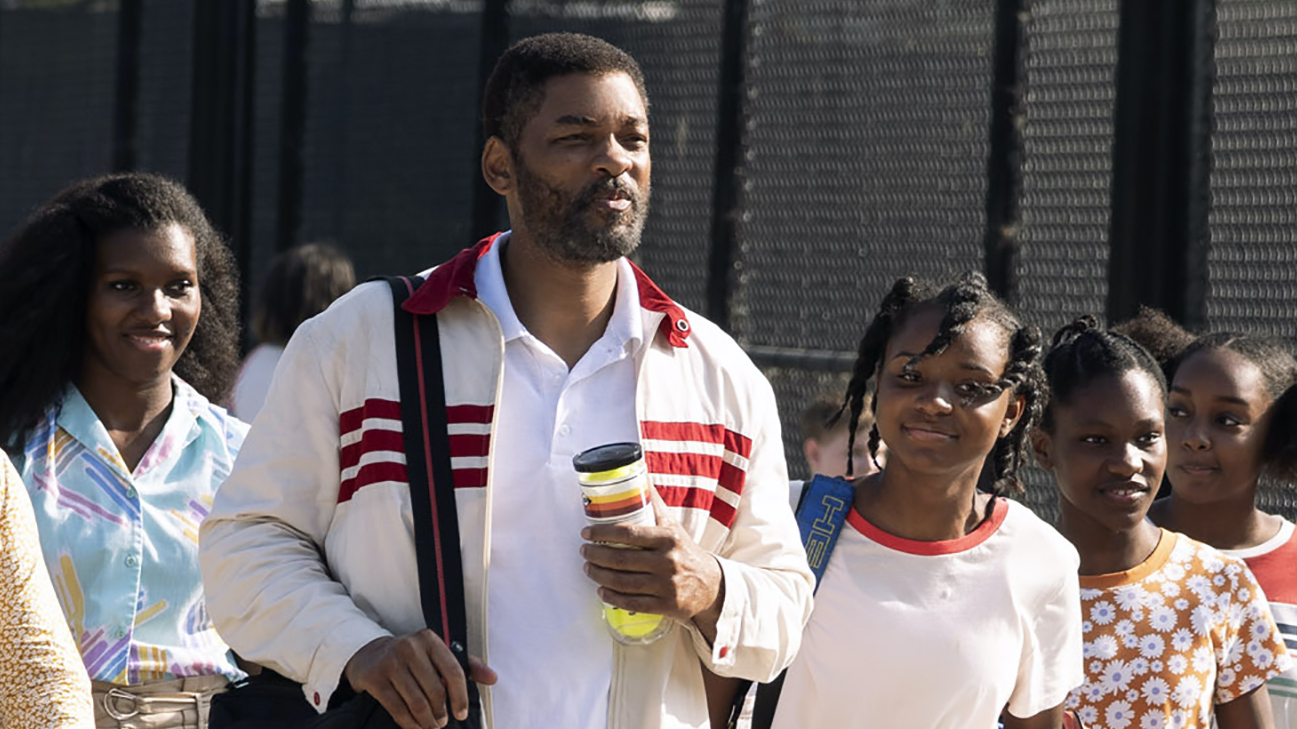What to Watch Verdict
For as compelling as Will Smith is, it just feels strange that Richard Williams should be the focal point of this particular story.
Pros
- +
Will Smith is giving a complex and nuanced performance
- +
Aunjanue Ellis deserves just as much credit for her supporting turn
Cons
- -
The narrative structure is unwieldy and bloated
- -
Richard remains the focus for so much of the film that he overshadows the accomplishments of the daughters he raised to stardom
Sometimes it’s pretty easy to tell why a particular film exists, beyond the obvious reason that someone wanted to tell a particular story. Sometimes it’s a reaction to a demand for a kind of narrative in the marketplace. Other times it’s a desire to serve an audience that is otherwise cinematically underserved. Both of those might have factored into the calculus of greenlighting King Richard, but the larger consideration mostly likely has more to do with positioning the film as an awards contender for Warner Bros., specifically for Will Smith in the leading titular role.
Normally, there isn’t anything wrong with that, but a film usually needs to provide a foundation to allow it to be driven by a singular performance. King Richard struggles with maintaining narrative focus on anything other than Smith’s performance, and it makes the underlying story a bit unwieldy as a result.
Smith’s patriarchal role is of Richard Williams, the father of tennis stars Venus and Serena Williams (played by Saniyya Sidney and Demi Singleton, respectively). Backed up by his wife Brandi (Aunjanue Ellis), Richard formulated a detailed and extensive plan for Venus and Serena to elevate from their humble Compton origins to a level of success that would take the entire family with them. However, as Venus in particular starts to garner the attention of tennis coaches such as Paul Cohen (Tony Goldwyn) and Rick Macci (a perpetually exasperated Jon Bernthal), Richard’s controlling nature butts heads with not only the conventional wisdom of how tennis stars are made, but with his relationships in the family he’s putting so much effort into bringing out of poverty.
Because King Richard is so centered on Smith’s performance, it is worth noting that he’s delivering some of the best work of his career. Richard Williams is a complicated man to portray, and the film implies an underlying genius to his methods, such as holding Venus back from Juniors competition to prevent professional burnout, while also acknowledging that Richard had a tendency to run away from problems he could not plan for and had an authoritarian streak that could manifest as a nasty temper. There’s an insecurity in his own intelligence that often belies those who are, in fact, more intelligent than their circumstances in life let on, and much of that is tied into an acknowledgment of the racial divides that defined America both then and now.
What Smith brings to the performance is a sort of raw, personable energy, occasionally funny but more often self-protectively guarded than lovably vulnerable. He’s a fast talker, maybe even a bit self-aggrandizing, but always supportive of all five of his daughters in the only way he knows how: by pushing them to be more than they think they can be. Say nothing else of King Richard, but its star performance is a compelling one.
It’s disheartening, then, that the film feels particularly unfocused as a story, unsure of what it needs to cut from a perversely bloated runtime of two hours and 27 minutes in order to make a tighter narrative, but also unaware of what sort of structure would best serve its lead. The tricky business of making a film about Richard instead of Venus (or even Serena, who becomes economically sidelined in the film’s back half) is that much of Richard’s accomplishments are shown by proxy through Venus’s success, which necessarily draws attention away from Richard while needing to constantly cut back to him, even after his semblance of a character arc has completed.
Richard's arc really is merely a semblance, for as much as the film is willing to acknowledge Richard’s egotistic failings, it doesn’t quite know how to hammer them into the shape of a satisfying evolution of his character. The closest we get is a scene that feels like the emotional climax about a half-hour before the credits roll, where Aunjanue Ellis gives a come-to-Jesus monologue that rightfully places her in contention for Best Supporting Actress this year, but it condenses a film’s worth of emotional growth down to one scene so that all of Richard’s empathetic development takes place over the course of about an afternoon in the film’s three-year timeline. It’s a sloppy solution to Zach Baylin’s screenplay, which lacks any sort of satisfying resolution for its title character, who is effectively studied in the first half, only to be distractingly omnipresent when it comes time to pass the torch to the prodigies he raised.
The latest updates, reviews and unmissable series to watch and more!
Even so, it’s hard to deny King Richard its crowd-pleasing charms. Particularly as an all too rare depiction of Black familial support and bliss in mainstream American filmmaking, it's sure to cement its place in the pantheon of inspirational sports narratives for the pedigree of the athletes it profiles and the impoverished circumstances of their upbringing. It just feels strange that Richard Williams should be the focal point of this particular story, as if he deserves the lion’s share of the credit for Venus’s and Serena’s careers when it’s them who are out on the court playing. As charismatic and nuanced as Will Smith’s performance may be, there's a nagging sense that maybe his shouldn’t have been the title character.
King Richard releases theatrically and on HBO Max on Nov. 19.
Leigh Monson has been a professional film critic and writer for six years, with bylines at Birth.Movies.Death., SlashFilm and Polygon. Attorney by day, cinephile by night and delicious snack by mid-afternoon, Leigh loves queer cinema and deconstructing genre tropes. If you like insights into recent films and love stupid puns, you can follow them on Twitter.


